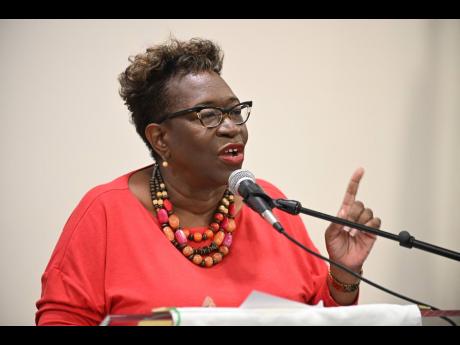DPP urges guilty to admit crimes, lighten court burden
Noting that it is impossible to complete all 122 cases down for trial in the current term of the Home Circuit Court, Director of Public Prosecutions (DPP) Paula Llewellyn is urging defendants to plead guilty if they are and not to further burden the judiciary system.
The opening session for the Hilary Term of the Home Circuit Court was held on Monday.
“Out of these 686 cases [this term], most of them are from last year, traversing to this year. One hundred and twenty-two cases have been set for trial ... . You cannot try all those cases. In fact, all over the Caribbean, when I talk to other DPPs, all of them, especially post-COVID, have heavy, heavy lists in the criminal arena. You can’t try all cases,” Llewellyn said on Thursday as she addressed the weekly meeting of the Rotary Club of Kingston meeting at The Jamaica Pegasus hotel in New Kingston.
“So to a certain extent, we have to seek to dispose of some the cases by inviting or persuading – not coercing because we always have to be fair and very professional – but inviting the defendant to plead guilty because if you know you have done it, then you should plead guilty. But you know in Jamaica, we have a ‘buss-di-case’ mentality, but ... I am pleased to say that more and more attorneys are engaging with us and we engage with them,” she said.
Llewellyn said that she and her staff show the defendants’ lawyers that if it is that a client goes to trial and is found guilty, they could be facing 40 years or more. However, if they plead guilty, they can receive life imprisonment, starting at 30 years, and, perhaps, become eligible for parole.
The nation’s chief prosecutor noted that in Manchester alone, there are 268 cases, and two Crown counsels have been sent to prepare these cases over four weeks. In St James, there are 273 cases, with two senior Crown counsels also sent to read and prepare those cases.
Llewellyn lamented that the Crown counsels not only have to read and prepare cases, but they have to try to persuade the defence to consider having mature discussions with their clients in terms of pleading guilty.
“We have to decide if the case is not going anywhere as a matter of law, they offer no evidence, or we enter a nolle prosequi. We have to relate with the police. We have to convince witnesses, who tell you they are in fear, to make sure that they come to court. But guess what? You cannot try all those cases,” she said.
Despite this, Llewellyn reiterated her moot for a 40-year pre-parole period for life sentences for murder “because in the most egregious cases, it would give the judge more latitude because you can have the starting point [at] 40 and below”.
She continued: “In light of what the Court of Appeal is saying – that you cannot have the starting point being more than what it is meant to be for the purposes of a plea of guilty in a case where life imprisonment would be part of the sentence – I thought that that would have been the tempered, measured way to go.”
Llewellyn also emphasised that whenever there is public outcry for rights and a clamour for accountability, transparency, and justice, it is noted by the judiciary.
“It is a fact that to a lot of members of the public, it would seem that even Parliament itself tends to be very fixated, maybe because they have so many defence counsels in Parliament,” she said.
The DPP noted that some 98 per cent of the lawyers in the Houses of Parliament come from the defence bar, which caused the long delay in passing legislation for prosecutors to get the right of appeal.

